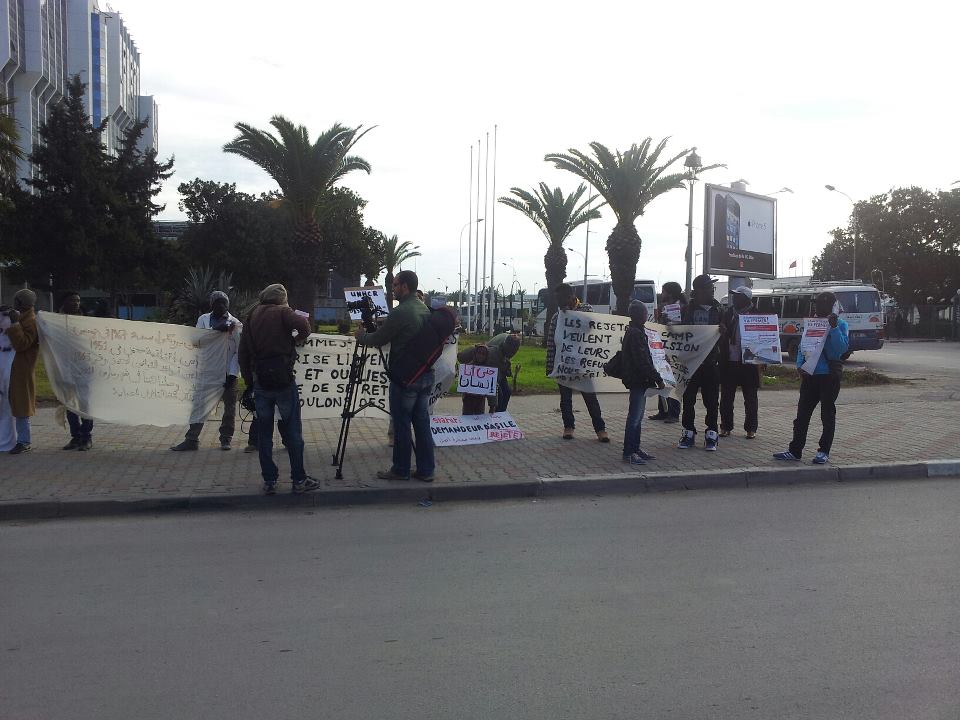About 100 rejected asylum seekers from the refugee camp in Choucha are currently protesting in Tunis.

About 100 refugees from the refugee camp in Choucha, which lies on
the border between Tunisia and Libya, reached Tunis on Monday 28th
January in order to stage a protest that will continue for several days.
They had no choice but to live in the desert for two years while the
UNHCR negligently worked on their cases, and eventually rejected them as
refugees. Since October 2012 they have been denied access to food and
medical care. Now the protesters have taken the necessary steps to
challenge their isolation and the consequent lack of prospects.
Idle individuals become activists
The camp in Choucha was established during the Libyan civil war
during winter 2011. It offered refugees the opportunity to access an
asylum procedure and to travel on to participating states in the
framework of the resettlement programme. Over the past two years, daily
life in the refugee camp hasn’t had much to offer apart from unbearable
periods of waiting while putting up with the heat and sandstorms. This
particularly affected refugees who were not recognised as such by the
UNHCR.
The camp has to be seen as a part of the externalisation politics of
the European Union – it prevented hundreds of people from challenging
the EU’s border regime by trying to enter its territory, by embarking on
a boat. At the same time, granting access to a limited number of
refugees allowed the media to paint a different picture, diverting
public attention away from a militarised campaign against migrants.
Germany (pop. 82 million) demonstrated its extraordinary generosity by
accepting 205 refugees, whereas Tunisia (pop. 10 Mio.) welcomed half a
million people during the Libya-crisis. However, only people who hold a
refugee certificate are granted access to the resettlement programme.
Many of those who the UNHCR did not recognise as refugees have already
traveled back to their countries of origin. 230 of them are still in
Choucha. They accuse the UNHCR of severe mistakes and negligence in
processing their demands for asylum. These errors range from biased and
incompetent interpreters, misspelled names of places and families to the
cooperation with the government bodies that refugees fled from in the
first place.
The ensuing exclusion and lack of perspectives of this group of
about 230 people led to various protests last year and to the most
recent demand for an independent review of the rejected cases. In order
to make their voices heard, 100 of them traveled to Tunis.
No one is illegal – not even in Tunisia
The journey to Tunis represents an act of resistance in itself.
Because they have been rejected by the UNHCR, the group of 230 refugees
are now considered “illegal migrants” by the governent and are not
allowed to move freely. That is why they may be arrested, detained and
deported at any time if the Tunisian state decides to. Until now the
illegalised protesters have only been detained for short periods of time
and sent back to Choucha after having been told that the UNHCR is
reponsible for them. In this passing on of responsibilities the UNHCR’s
most recent course of action is remarkable. Since October 2012 rejected
asylum seekers are being denied access to food and medical care. This
scandalous and merciless strategy of a reputable humanitarian
organisation evidently aims at forcing people to leave.
The refugees keep emphasising that because of persecution and/or war,
they cannot return to their home countries – which the UNHCR would have
been able to ascertain if it had adequately reviewed their cases. They
decisively reject the UNHCR’s cynical suggestion to just go back to
Libya
1.
This is why two central demands of the current protest are for the UNHCR
to resume the supply of food and medicine to the refugee camp, and to
allow access to the resettlement programme for everybody who remained in
Chocha. The latter demand is also directed at the European Union and
all NATO states that caused the current situation by intervening in the
civil war in Libya.
To reinforce these demands to the UNHCR and the EU, and to make them
accesible to the Tunisian and the international public, the Chocha
refugees will stage a protest for several days in Tunis. In order to
achieve this, they need support! Please:
* Spread information about the protest via mailing lists, Facebook and by word of mouth!
* Sign the
open letter adressed to Ursula Aboubacar, the head of the Tunisian UNHCR, containing the demands of the protesters!
* Participate in the fax campaign and send a fax (
english, francais,deutsch) to UNHCR offices in your country, to the Tunisian Representatives and to their headquarters in Geneva.
* Donate money for food, transport and means of telecommunication for
the protesters. Transfers can be made to this bank account:
FFM Berlin
Sparkasse der Stadt Berlin
Account number: 61 00 24 264
Bank code: 100 500 00
Keyword: “Choucha”
* Organise solidarity actions – in front of UNHCR offices all over the world!
Further information you will find at:
Contact Germany: 00491734108642 (deutsch, englisch, francais)
Contact to the Protesters: 004915210453991 (deutsch, english, francais, ‘arab)

